I left town early the next morning. István had prepared me a dish of two fried eggs served with a hunk of brown bread and, on a side plate, a small, light green bell pepper that he had diced. Grateful, I ate this in his living room over a mug of coffee.
Out on the Plain
Having breakfasted handsomely, I descended from István’s flat and crossed Szolnok, ending up on a track on the south side of the Tisza river. Having crossed the river in the middle of Szolnok, I followed the dirt track on a bank to the side of a road for a few miles before turning off. Traversing over tracks in a rail yard near Szajol, I soon returned to my steppe routine and found a narrow path to the side of a field and through some woods.

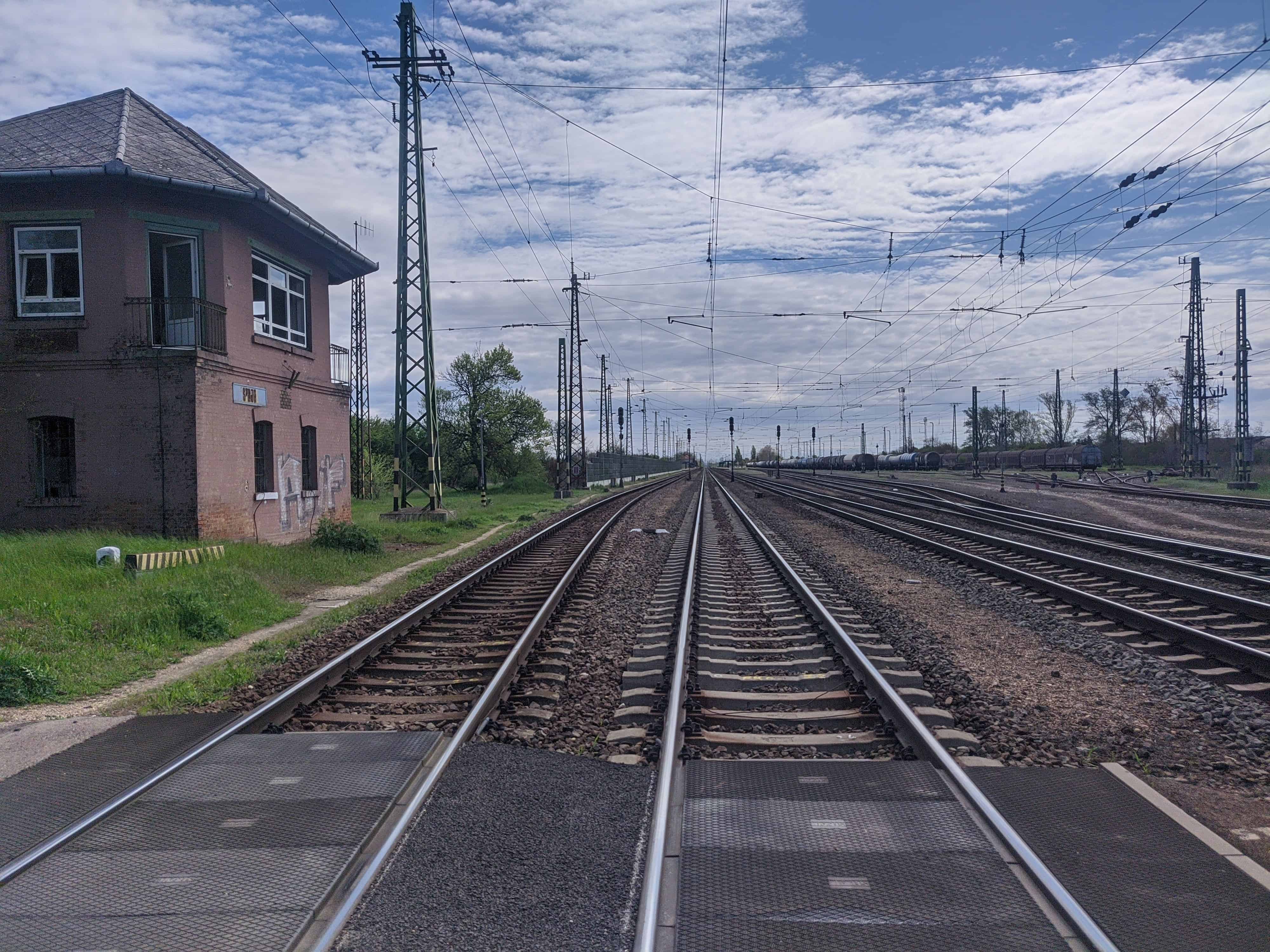
I skirted around and through towns bearing exotic-sounding names — perhaps their greatest asset: Örmenyes followed Törökszentmiklós. And soon, I was firmly back amongst the fields of the Great Plain.

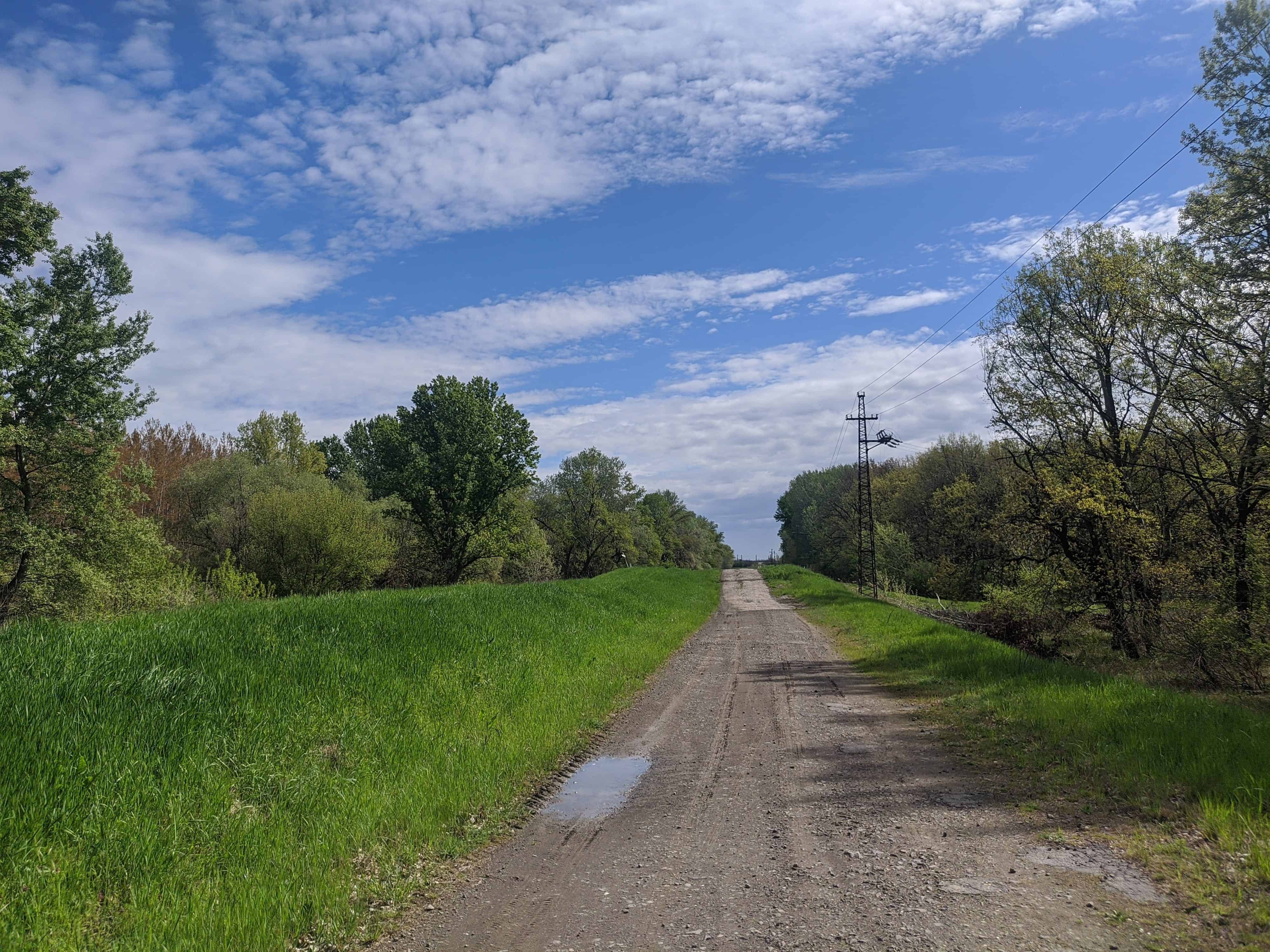
In the early afternoon, as I strolled down a track to the site of two sown fields, a single grey-tailed bunny, much the same size as a small dog, appeared in the middle of the path, sitting side on. As I approached, it watched me cautiously out of its right eye. When it judged my presence to be near enough, it bounded down the track and across the field to my left.

On the outskirts of Túrkeve, my destination, I picked up some late lunch – smoked salmon and a packet of cashews – and picnicked on the lawn outside the shop. At some point, as I made my way across town, I brought up 1000 miles for the walk! I celebrated with an ice cream from a parlour in town: yoghurt flavoured in a waffle cone, and all for just 450 forint (80p).

Many of these towns across the Plain were home to thermal springs; I arrived at the spa on the east side of town, where I was hoping to stay. Communicating with the young woman at the desk in German, she showed me out of the hotel area I had entered, escorted me across the campsite just outside the spa facilities, and stopped at a row of sheds lining the perimeter. She unlocked the door and inside were two short beds and a small window in the back wall. I’d say in all the “room” shed was 2.5m × 4.5m. Simple, but all that was needed.

I sat a while outside the reception building on a swing watching the sunset, before then heading into the reception to plan and unwind on the Wi-Fi (which my shed did not, unsurprisingly, come equipped with).

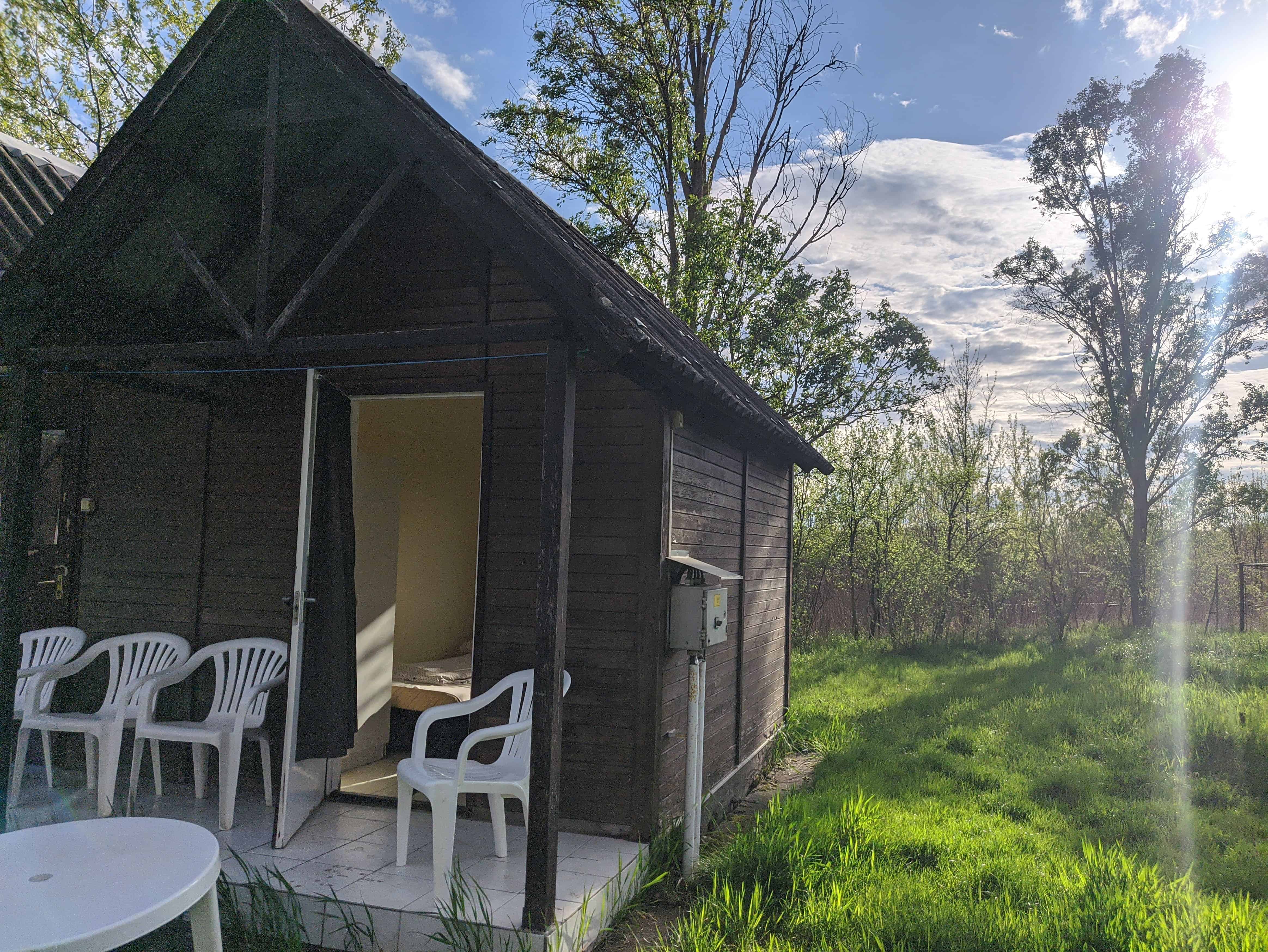
Language barrier, what language barrier?
I had half-hoped to be awakened by the light streaming in through the unblinded window in the back wall of the shed, instead it was my alarm that dragged me from rest very early that morning: there was a big day ahead. I had been up briefly in the middle of the night, awakened by the rain lashing down outside, pounding on the corrugated iron above me. Exiting my shed and then the town of Túrkeve, the weather was now more than fine — blue skies and a distinct early morning heat greeted me. Soon after leaving town, I entered Békés county.
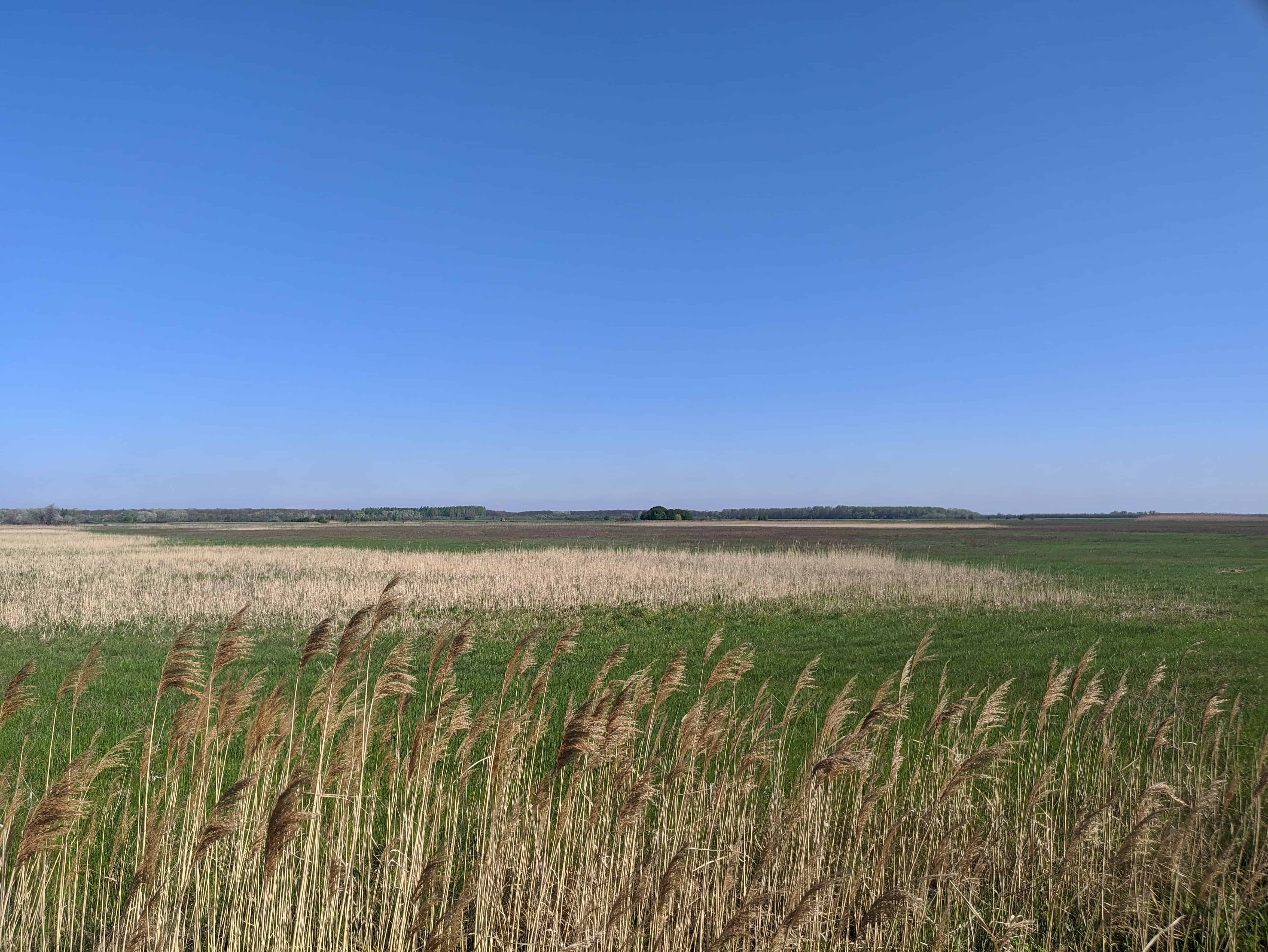
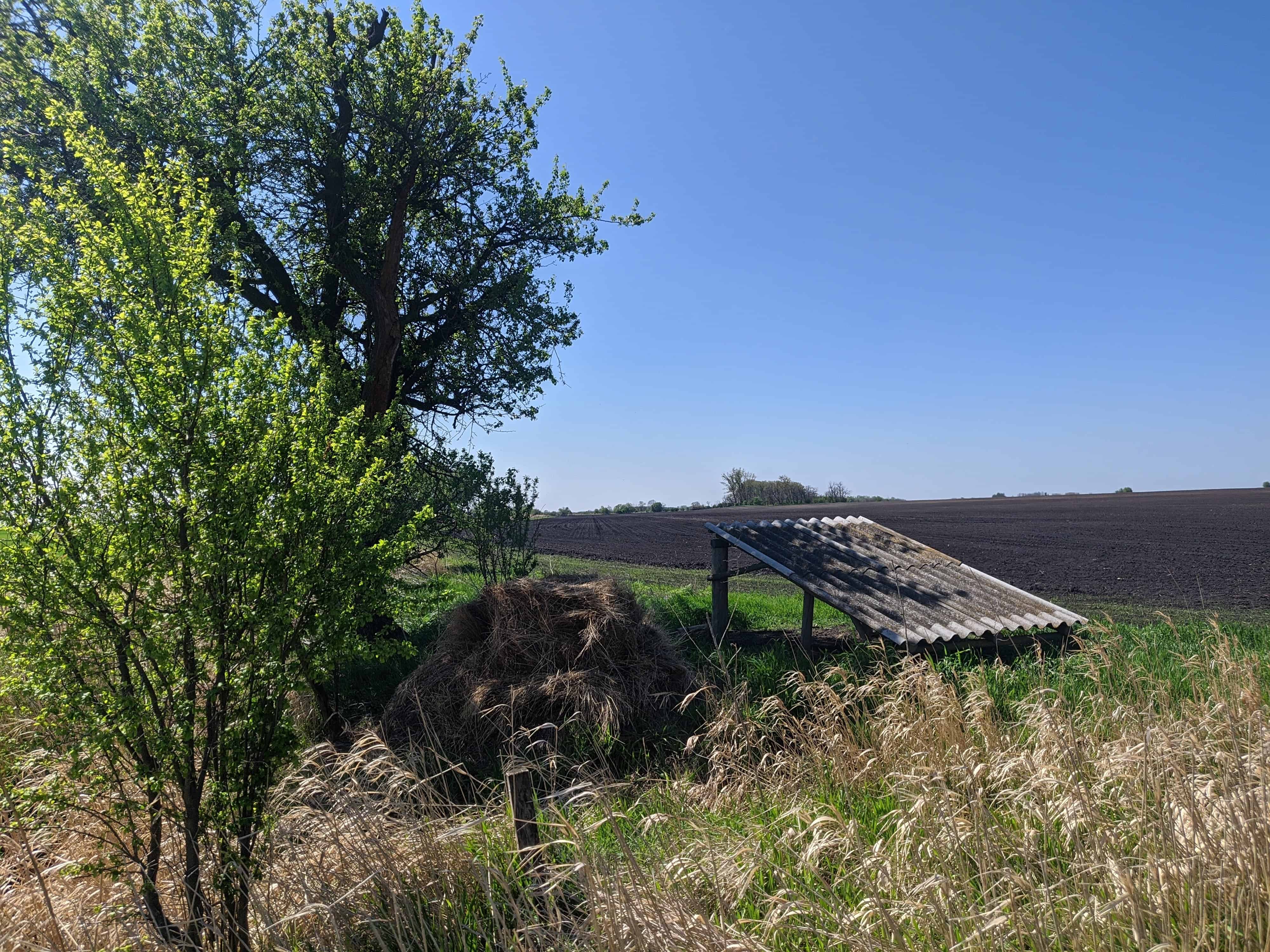
Through the day, I began to fear that my boots were beginning to fall apart: the souls were wearing thin, and my feet – which were, by now, oh so used to the shoes and routine – were beginning to hurt much too early in the day. I began to formulate plans for the procurement of a new pair. That, though, would have to wait until Romania.
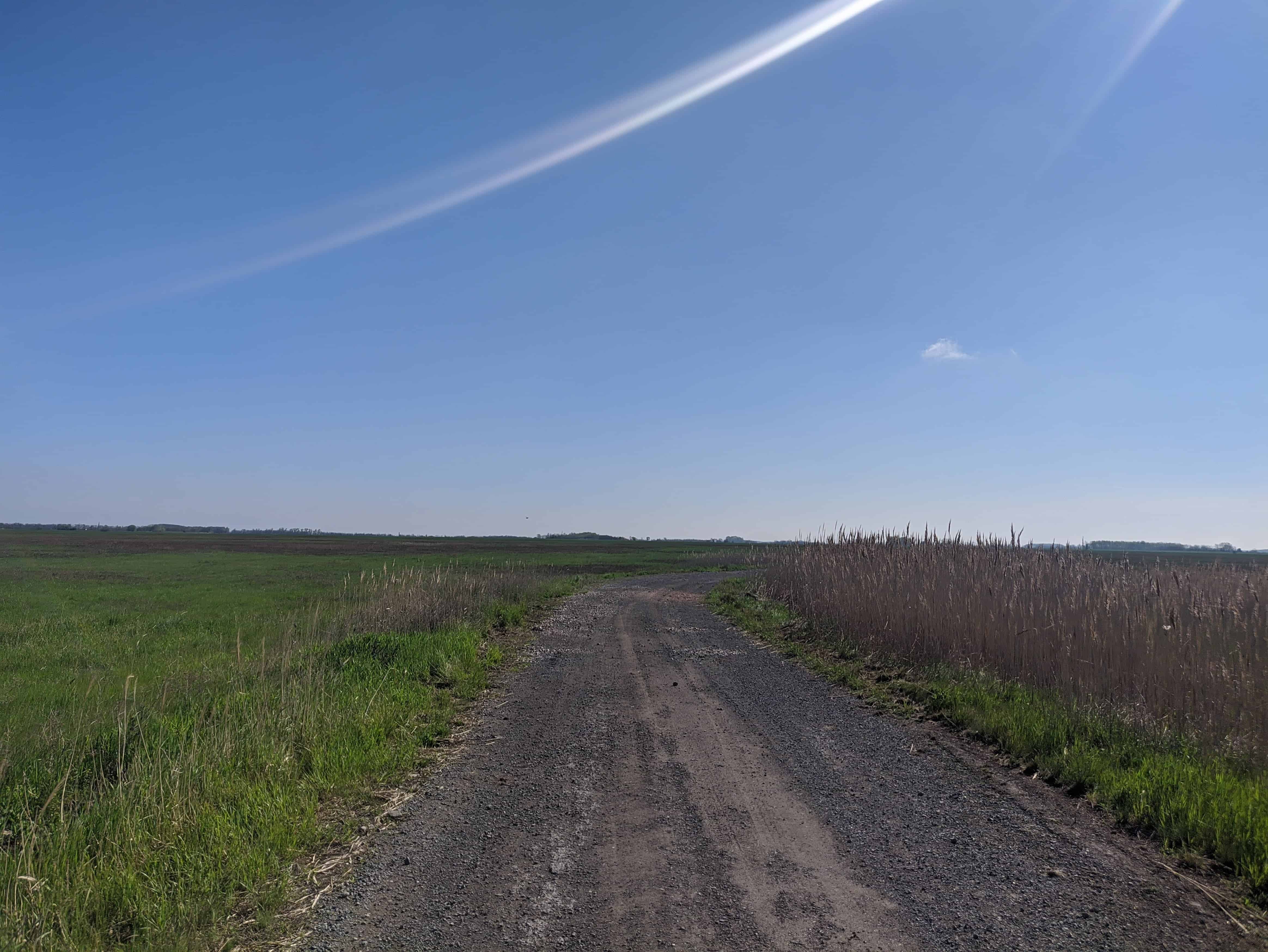
The whole day was spent walking through farmers’ fields, following ditches and clay mud trails through the nature of the Plain. And as such, after a few hours of walking, a water bottle refill was desperately needed; I stopped at the first farmstead I happened upon and tried my luck. The barks of farm dogs immediately started up, sending the geese and fowl scattering and squawking across the tiles and mud of the farm’s inner sanctum, running around tractors and machinery. Soon, just as I was trying to locate the doorbell of the farmer’s house – I had struggled to find an obvious tap through which to siphon off a litre of water – the farmer himself emerged. I greeted the old man, surprised to see me at his door.
“Szia?”, he said. Hello?
Ascertaining that he spoke no English or German, in abrupt Hungarian I asked, “Vizet kérek”. Water, please. He smiled, nodded, and headed inside. Returning to find me guzzling down the final drops of water from my bottle, he unscrewed the cap of an enormous four litre bottle of water, he took the flask from my hands and filled it to the brim. Thanking him, I readjusted my waterproof layers, which had fallen from where I’d strapped them to the back of my pack — he stood in the doorway drinking out of the flask. He spoke to me in Hungarian and made a walking gesture with his index and middle finger. I nodded. He smiled and, reaching out, I shook his dark and calloused hand.
Not half an hour later, a different farmer, this one sporting a bushy moustache, drew up alongside me in his small, communist-era tractor. He tried to ask me where I was headed. After a minute or so of circuitous communication, he gestured for me to hop in for a few fields. Confused as to where I would fit in the one-man cab, it all became abundantly clear when the farmer opened the tractor door, grabbed my bag, and hauled me inside to where a tiny wooden stool lay right next to him. I squeezed in beside him. In what was almost a scene directly out of some comedy skit, (predictably) the farmer tried unsuccessfully to start the ignition, though this in no way phased the farmer — he’d seen this all before. And, after at least 10 attempts, the rickety engine reluctantly grumbled back into life, all while I smiled straight ahead in amusement and encouragement. We pulled away, jumping up and down as we rolled across the field track of baked mud craters: it was the bumpiest journey of my life — all this, at a top speed of no more than 10mph. After a few minutes, the farmer gestured to me that he was soon going right, across the adjacent field. Having briefly consulted the map, I knew that I needed to continue straight; after a firm handshake in the small confines of the tractor cab, I hopped out with my backpack in tow, waved, and headed off once more across the Plain.

The grasslands and fields were an unmistakably vibrant green, filled with the usual fauna of deer and rabbits, goats and cattle, but also – on this day – less common additions of geese and pheasants. Clay mud lay underfoot, cracked and dry, but with occasional patches of sinking soil, that reminded me of walking on sand: I was soon alert to the tricksy terrain, though progress slowed for a while. But soon, after 27 odd miles of walking, I arrived in Füzesgyarmat: my final night’s stop in Hungary.
Steppe Paintings
Ever since setting off back in January, I had been very excited about travelling across the Plain. Though I admittedly had a limited idea of the landscape I would experience, my initial days to the east of Budapest took me a little by surprise: the hours spent in small woodlands and fields. I was adapting.
The Great Plain really began to take form in the days around and following Szolnok (especially during my day’s walk from Túrkeve to Füzesgyarmat. In an unexpected way, the Plain reminded me much of the rolling English country(side) — only flat. The grasslands and the farmers’ fields were a lush green, and their boundaries were marked by trees, shrubbery, and often drainage ditches lining the periphery. It was along these “borders” that I spent most of these days, passing the occasional farmstead or tractor; but, for the most part, I was both semi-off-road and alone. Taking in the scenery and tranquility, I crossed Hungary.

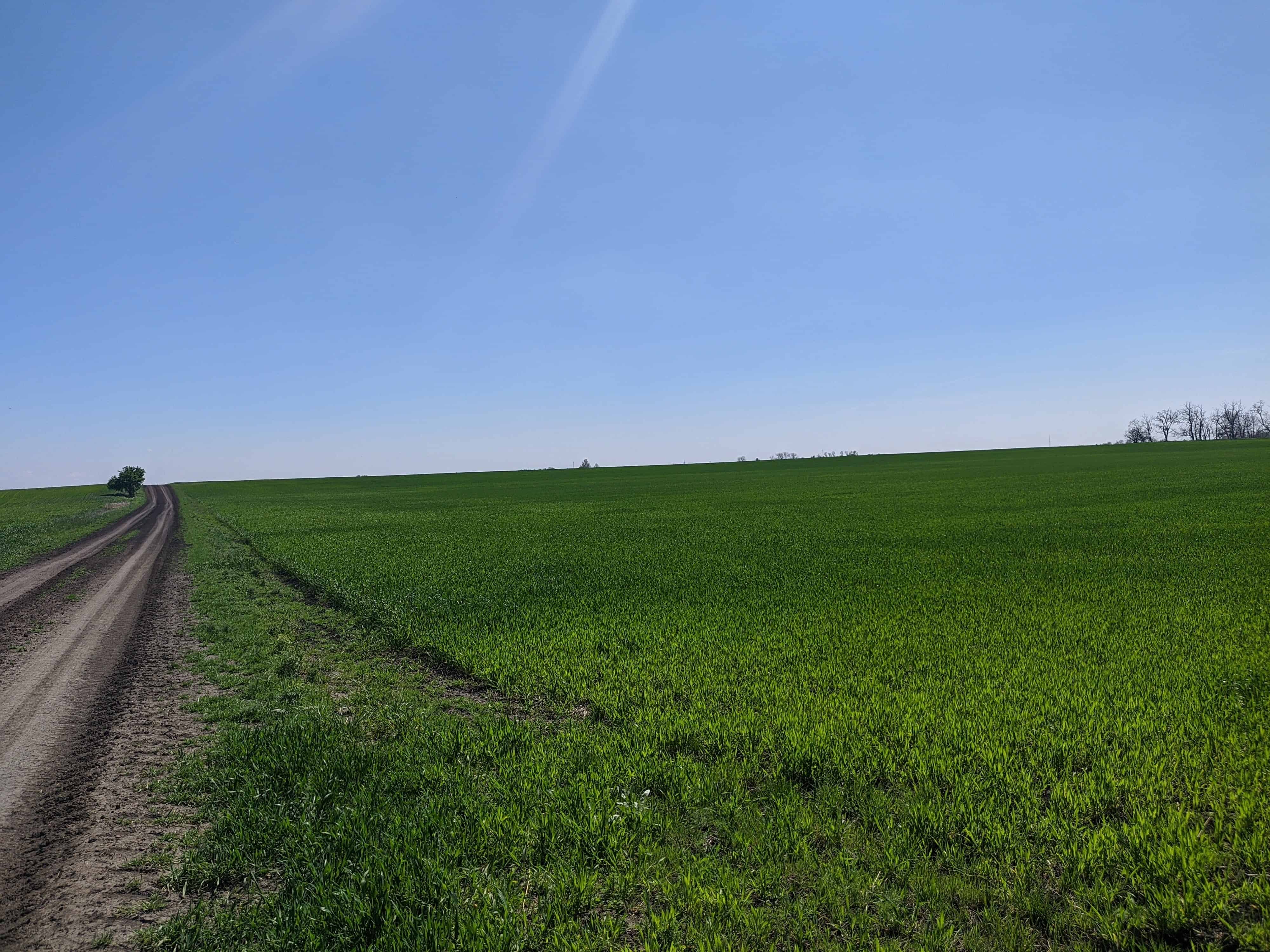
Much of the scenery would not be out of place in a Constable painting, complete with woods, fields, streams, dirt lanes, and timbered huts in grassy glades.
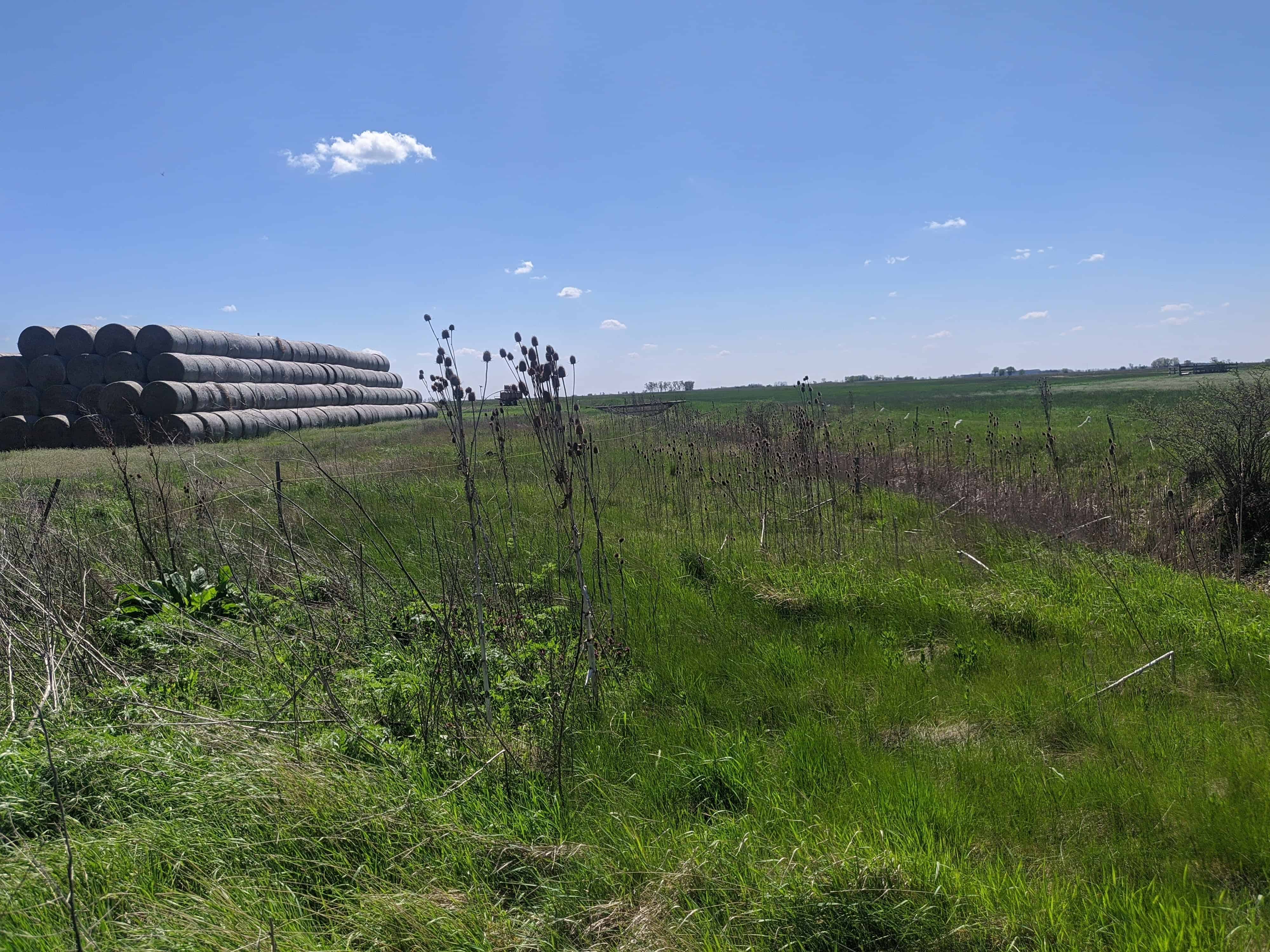

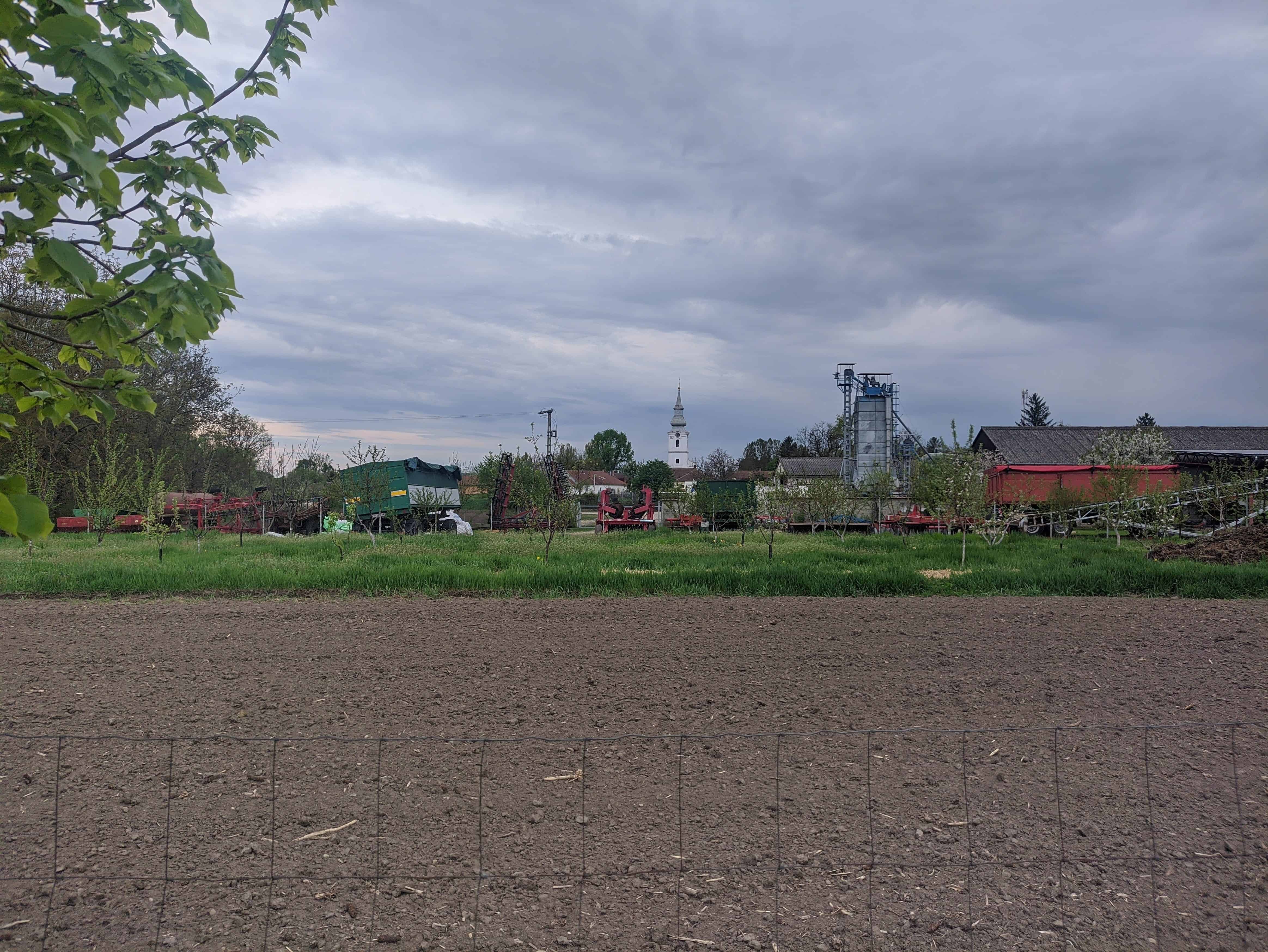
Away towards Romania
On my final day in Hungary, I set off bright and early, having breakfasted on the couple of bananas I had bought the night before. Entering the village of Darvas, I crossed the Barcău river into Hajdú-Bihar county. Two adjacent crane nests sat embedded on two electrical pylons. Two cranes peered down at me from one of the nests, before one headed back to its own abode. Just visiting. I had seen nest positioned similarly in various villages across Hungary.
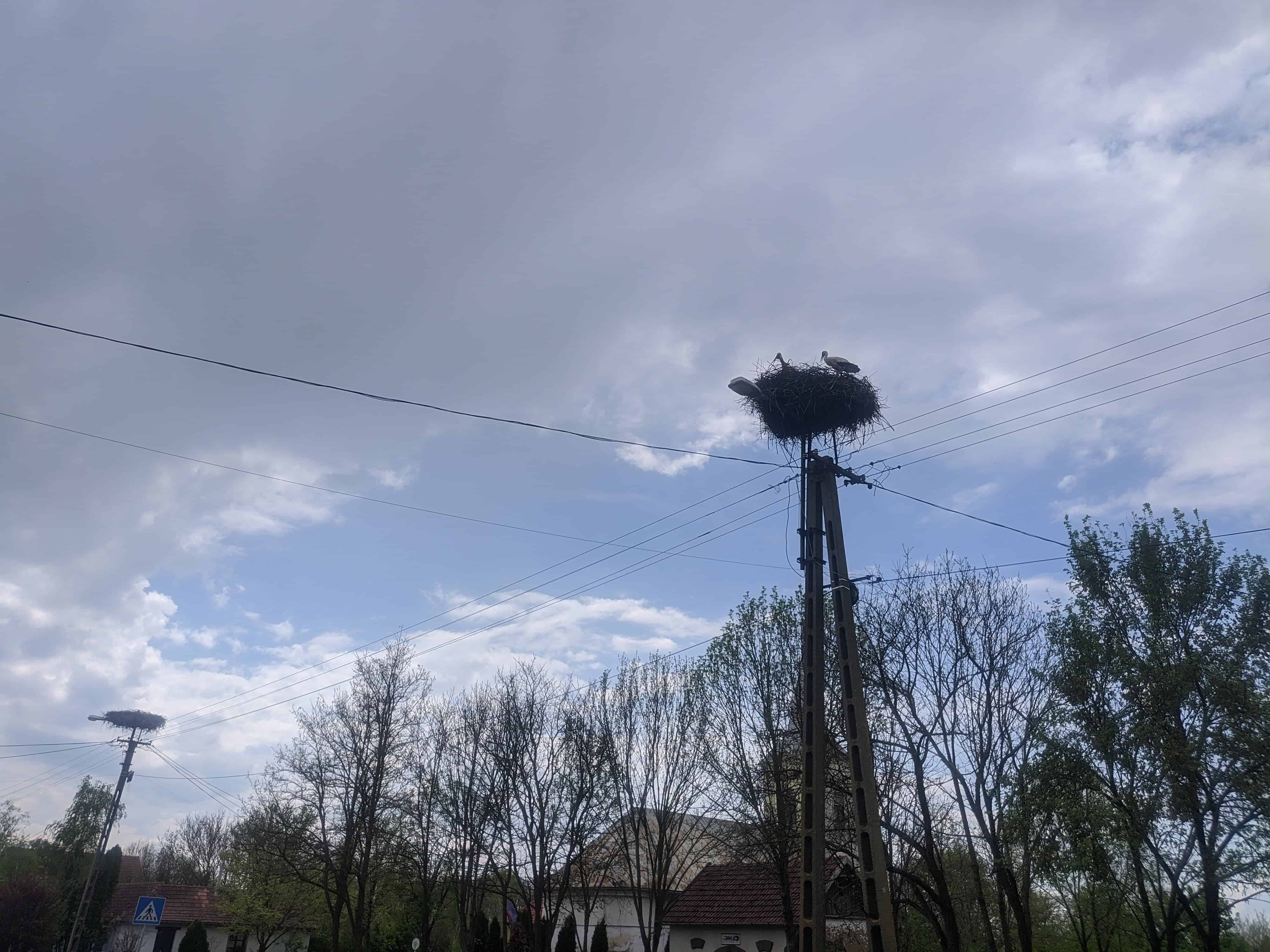

Walking down a dirt track to the side of a field at some point during the day, I spotted a car slowly making its way down the lane towards me. When it came within a few hundred metres, I waved to the driver, who I then sheepishly realised was holding a phone to his ear. This didn’t perturb his joviality, however, as he lifted his left hand to wave back at me as he passed, leaving the steering wheel to its own devices.
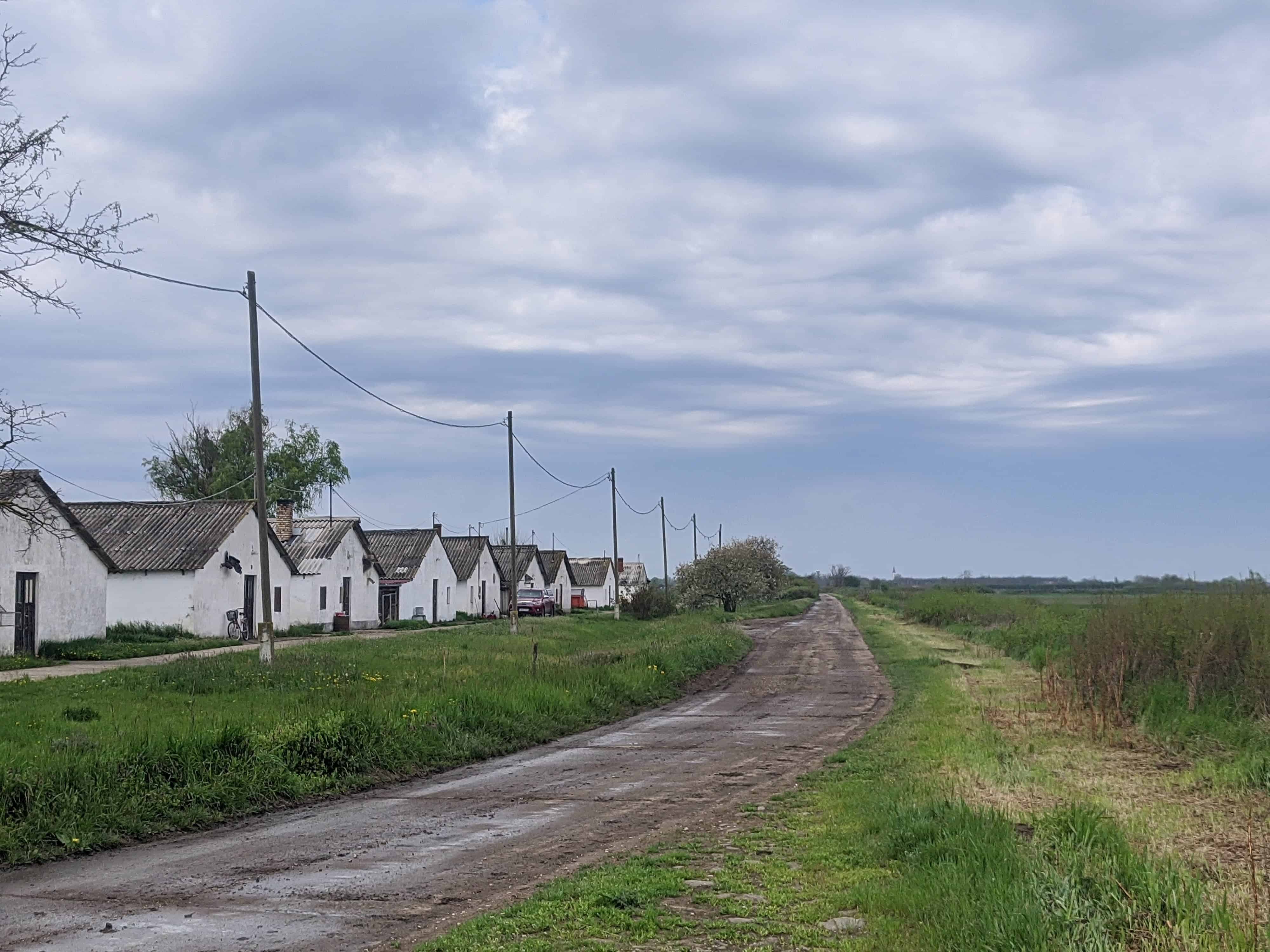
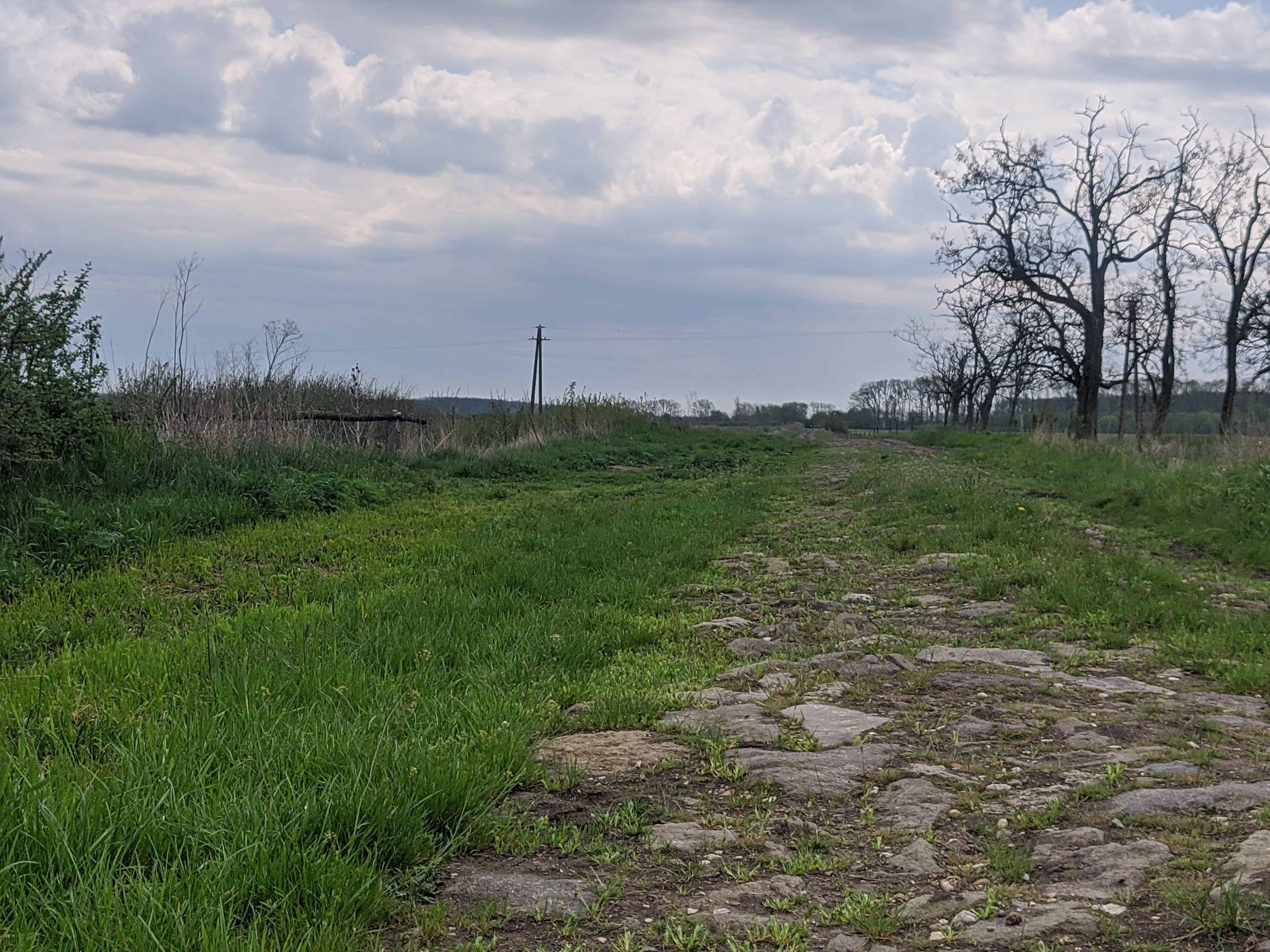
The town of Biharkeresztes marked the last Hungarian settlement of any size: a prime spot for coffee. An hour later, my last contact with anything resembling urban Hungary was a chicken coop, where three hens and a rooster observed me nonchalantly as I passed; I left the village of Ártand moments later and headed for Romania.

Out of Schengen
As I neared the border, I walked by queuing lorries, down a dedicated cycle lane. When I came near to the Hungarian border station, I took off my bag and fished out my bum-bag, which contained my passports and documents. I then headed across the Hungarian section, which lay unmanned. (I was a little annoyed because I wanted to be stamped out of Schengen! — had the slog all been for nought??). Between the two border zones, I stopped in a shack to use up some of the last of my Forint on a ginger ale and a pack of gum — I still had about 600FT (£1.50) left.
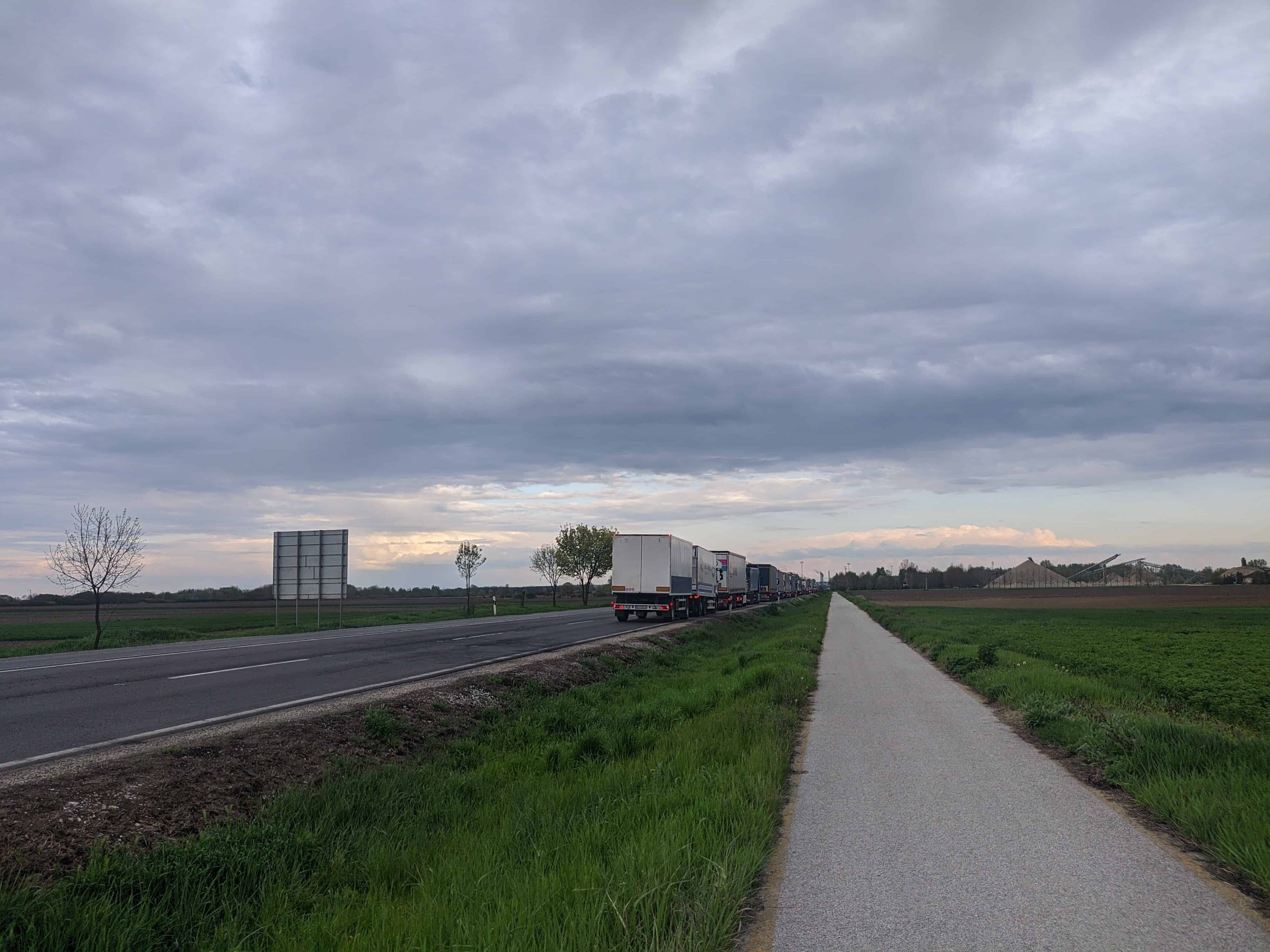
I headed to the Romanian post, where the lane I was following began to take me through an unmanned section, as I realised I was about to walk through without any official blessing, I turned around and headed back to where a border guard station lay (all while being watched by the queuing cars entering Romania). An off-duty Romanian guard told me to head to the booths the cars were queuing towards. Half walking as a car and half cutting the queue (a kind lady let me in), a Romanian guard took my passport: when he asked me where I was going, where I’d been in Europe previously, and what I was visiting Romanian for, my answers – likely not your average “business” or “tourism” response – seemed to cause great interest. He exited his booth, briefly outlined the 90-day Schengen rule (which he confirmed I had adhered to) and the same 90-day Romania rule, and instructed me to hold tight: he popped over to another car border booth to get a Hungarian colleague to stamp my passport to verify I had left Schengen, and then, after waiting for a couple of minutes, the passport was returned to the young Romanian officer back in his both, who stamped the passport himself. Exiting his booth once more, he enquired further about my trip – in an unofficial capacity, this time – and to where exactly I was headed. He couldn’t quite wrap his head around the notion of both this being a wholly solo-trip, and me doing it solely on foot: “Why not on a bicycle?”, he kept repeating. After a minute of discussion, he wished me good luck and shook my hand. And I walked off into Romania. Not the average border crossing and guard experience, I would hazard.

I was in Romania! Another signifier of progress came a few minutes after my border crossing, when I first checked my phone and spotted the time — I had walked across my first time zone! Though I had been very conscious of the fact this would be so a few weeks earlier, it had slipped my mind as I crossed the border. I was now on Eastern European Time: two whole hours ahead of home. Progress and distance.

After a 31 mile (50km) day, I headed to a border-side hotel in Borș (the first town across the border — really a suburb of Oradea). It is very much a transit town, and I passed queues of lorries heading towards the Hungarian border: the Hungarians seemed to have more traffic and slower, or more thorough, border checks. Along the side of the road were lots of crumbling homesteads, with gardens of crops in dusty, dry soil, and ramshackle barns attached to brick and beamed homes. (Not a million miles away from my concept of the fictional town of Anatevka, I briefly thought.) I reached the hotel around 7:45EET. After checking in, I dropped off my bag in my room and headed for a celebratory supper.
For the most part, I have avoided weighing down these entries with numbers and distances (the “logbook” holds the key for those curious about that specific element of the walk), however it is important to note the speed at which I walked across the Great Plain, from Budapest to Romania. I travelled fast: covering the 160 odd miles from the capital to the border in just 7 days (averaging just shy of 23 miles (ca. 37 km) each day). My final three days of this stretch were a particularly marathon-like/mammoth challenge: 26, 29, and 31 miles in consecutive days (the last of which being the furthest I’d ever walked in a day). In many ways, the nature of these three days twinned themselves with my three-day “training sprint” across Hadrian’s Wall last summer, with its consecutive days of 25, 30, and 30 miles. This, however, being neither an established trail, nor in familiar territory, was a vastly different beast.
My race across the Hungarian Plain was successful: walking across the border on my 90th and final permitted day in the Schengen zone. Romania lay before me, and Transylvania beckoned, not far off.

Another great episode much enjoyed by me sitting comfortably at home. As an Honorary Consul for Hungary I was especially interested.
Thanks, Alun. I had such a great time in Hungary and, as you’ve seen, met so many kind and interesting people, as well as touring some stunning scenery. I can’t wait to get back there!
Very enjoyable!! How you are able to put down such great detail while you are
conscious of not exceeding the 90 day limit is amazing. Do you do a recording at
the end of the day? The sky is so beautiful .. the clouds! Looks like you
have the world to yourself .. with a few critters. The shed where you spent the
night looks charming. The yellow walls show the owner wanted to make it
as nice as possible. And now Romania!! Can’t wait!!
Haha..I liked the picture of the toilet bowl. We have a saying in Australia that goes along the lines that… “it is no use standing on the dunny seat, the red back spiders jump six feet”.
You look like a very happy wild man!
Really enjoyable read and the pictures are superb
Everyone seems very kind to you for which I am grateful
Granny xxxxx
Another fascinating stage in your amazing journey, and obvious detailed note taking to enable you to scribe each of these descriptive bogs of your travels,,
Congrats on continuing the journey with failing boots and persuasive personality to obtain water or food to sustain you